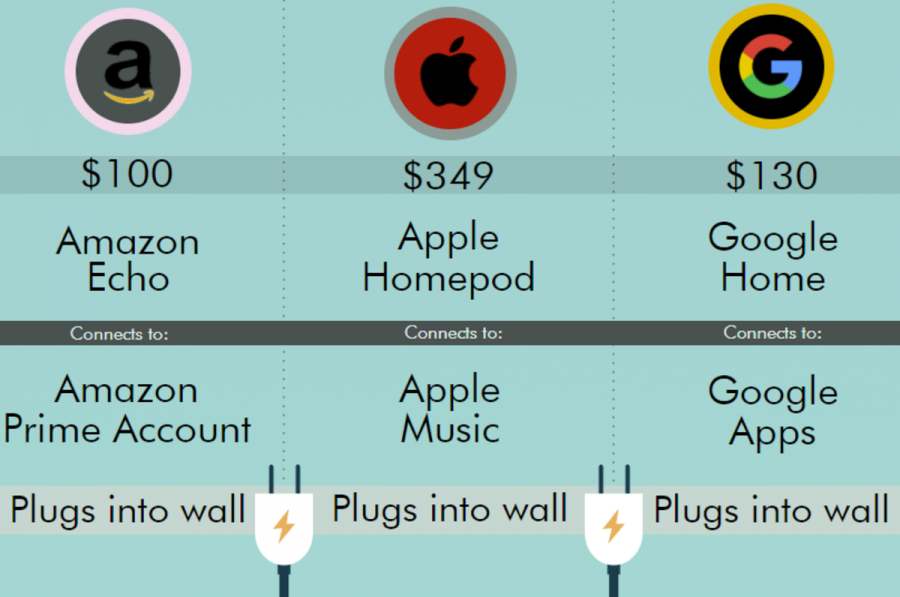Smart speakers to take over homes
March 8, 2018
“Alexa, play ‘God’s Plan’ by Drake.”
After Amazon, Google, and Apple all released smart speakers with voice command, hands-free phone calls and internet access, the market for smart home technology has continued to grow. In tandem, though, privacy concerns about the speakers’ household control and “listening” features have also arisen.
Beyond playing music and making calls, smart speakers can control many household functions, like turning lights on and off or adjusting the thermostat. They can also provide information straight from the internet, similar to the personal assistant voice control feature on most smartphones.
“It’s a device that is on call 24/7. You can ask it questions, tell it to do things. It’s your own Google, always ready to help,” Mike, a technical support representative from Google Home, said. “From enjoying your favorite music to hearing the morning news, from checking traffic to adjusting your thermostat, you can ask Google Home anything—no hands required.”
Many students find that smart speakers make it easier to multitask. Sophomore Kate Snedeker likes how she can change the music and volume or call and text people, all while doing other things.
Some students use smart speakers while doing their homework, especially when they need to define words or quickly look up facts. Junior Maya Valencia uses her Google Home to define words while completing readings for her classes.
“All I have to ask is ‘what does this mean,’ and the speaker instantly gives me an explanation about whatever I was asking,” Valencia said. “It’s so simple, and only takes a few seconds.”
Many of the speakers can also control various aspects of a user’s house. Users can set up the speakers to control home functions on a set schedule, which helps busy families simplify their routines. By merely saying the phrase “good night,” Amazon’s Echo speaker can be set to turn off the lights, lock the door, and turn off the TV, Amazon Alexa technical support team member Chakradhar said.
While some users enjoy the efficient aspects of the smart speakers, others recognize that the increasing use of these speakers and similar products may make people overly reliant on technology. Junior Halle Williams believes that after many people bought smart speakers, reliance on technology has increased, she said.
“I think that it now may be a ‘technology overload,’ considering that humans need just their voice to control the speaker, meaning that we do not need to get up and manually control it,” Williams said.
Others are concerned about privacy, as they feel like their speakers can hear their conversations within their household. Since the speakers perform functions by listening to verbal requests, some worry that the speakers can hear other dialogue, too.
“I believe in the conspiracy that the speakers listen to my conversations,” sophomore Clara Russ said. “When they’re plugged in, they listen to us to do different functions, so it makes sense that they’d hear everything in between.”
Still, many users still praise the new trend, as they make daily life more efficient.
“Ever since I got one, I can do more things at once,” Williams said. “That’s honestly the best part.”








